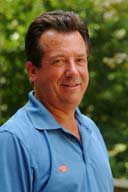
Haverford, PA — This summer, Sean Sloane announced his retirement as the head men’s and women’s squash coach at Haverford College. Damon Leedale-Brown recently began his first season at the helm of the Haverford squash program.
Beginning in 1970, Sloane has been connected to college squash. He served as the coach of Williams for the better part of sixteen seasons. In 1987, he joined the United States Tennis Association as the Director of the Education and Recreation Program. In 1997, he returned to squash coaching at Haverford.
During Sloane’s tenures at Williams and Haverford, his teams were known for their sportsmanship. In 2005, the men’s College Squash Association renamed the team sportsmanship award after Sloane.
In October, Sloane had hip revision surgery. He was nice enough to chat with the College Squash Association during his recovery. Below is a portion of our interview.
CSA: Why did you retire?
Sloane: I’m not completely retired — I am still coaching men’s tennis at Haverford. But, it was time. I don’t think there are many coaches out there coaching three teams (men’s tennis, men’s squash, and women’s squash), and the overlapping responsibilities have gotten more complex, especially the recruiting aspects. And I can’t be on the court any more in squash — both hips are artificial and I am just now recovering from a revision of my right hip.
CSA: What will you miss the most?
Sloane: The day-to-day interaction with the teams and the many great friends I have made through the sport.
To be more specific, I have never found anything to match what I call the “light-bulb moment.” As a coach, you work with players on all kinds of technical and tactical improvements. Each improvement takes time. But there always arrives that moment when you and the player both see the idea kick in, the player makes the change, positive results are virtually instantaneous, and a huge smile comes across his or her face. Those moments have always been, for me, the most powerful and inspirational aspect of squash coaching.
As a corollary to the “light-bulb moment,” there are also “transcendent moments” — these are times during match play when a player of yours suddenly puts together all that you have both been working on and plays a series of almost perfect points. Again, the joy and wonder on a player’s face after such transcendent moments — hard to match!
CSA: What do you consider the highlights of your squash coaching career?
Sloane: In both tennis and squash, I had great mentors. John Conroy, Princeton’s squash and tennis coach and my summer boss for five years, showed me what it meant to be a tennis professional. Clarence Chaffee, my predecessor at Williams (where he coached for 37 years), was a great role model and always emphasized sportsmanship. When Haverford’s women won the Chaffee Award for sportsmanship at Howe Cup in 2003 and Haverford’s men won the Conroy Trophy at the National Team Championships in 2002, those were very emotional moments for me.
And I have always been very proud of the fact that during my 17 years at Williams four players who began playing squash in college graduated as All-Americans.
But when my fellow coaches surprised me several years ago by re-naming the CSA Team Sportsmanship Trophy the Sloane Award — I consider that the culmination of all I have tried to be as a squash coach!
CSA: If you could change one thing about intercollegiate squash, what would it be?
Sloane: I would mandate that all intercollegiate squash matches begin with the players themselves, inside the court, making the decisions. To me, the best, fairest, and most rewarding squash matches occur when both players respect each other and the traditions of the game and battle each other on equal terms to the finish. We have lost this unique aspect of our sport by asking our teams to serve as referees from outside the court. Refereeing squash from behind the court is incredibly difficult and takes years of experience. But even more important, as coaches and educators, we should be asking our players to accept the challenge of respecting the traditions of squash by giving the benefit of the doubt to one’s opponent in all decisions. If either player feels that this is not happening, he or she could ask for the present refereeing system — but first give our players a chance to prove themselves great sportsmen and sportswomen!
CSA: Do you have any advice for the College Squash Association?
Sloane: Maintain our autonomy! Never allow NCAA or US Squash to take control of intercollegiate squash. Pursue partnerships with them, but retain control of our sport!
CSA: Do you have any words of advice for CSA coaches?
Sloane: I feel incredibly fortunate to have spent most of my working life as a coach. I have been a high school and college English teacher, a squash and tennis professional, a professional tennis coach on the ATP Tour, an ITF and ATP Referee for major professional tennis tournaments, and an administrator for the USTA — none of those ever matched coaching for personal satisfaction.
Coaches may not make a lot of money, but where else can you sleep late most days, come to work in a sweat suit, enjoy long vacations, and be inspired each day by the energy and desire of intelligent young men and women to improve themselves? What a life! Do whatever you have to do outside of coaching to allow you to stay in coaching — it is the best!
CSA: Anything you would like to say to your friends in the college squash community?
Sloane: Best wishes to all my friends in squash — I hope to see you all around the courts this season and in future years!



